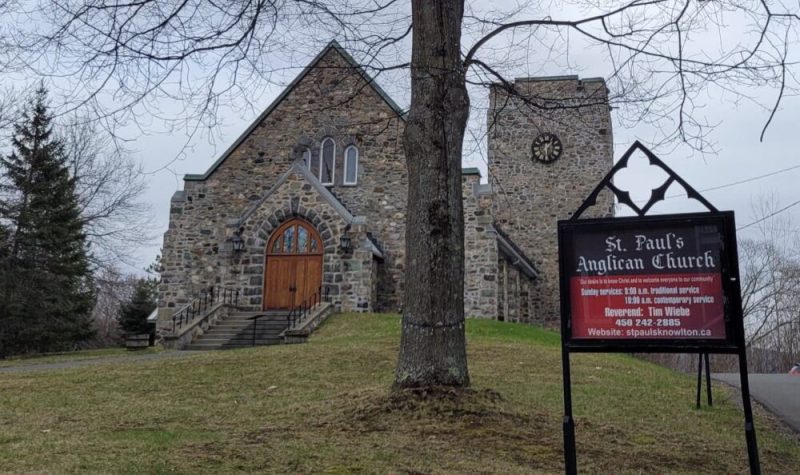St. Paul’s Church in Knowlton has been working closely with Reed Bousada – who once owned a flooring company in the village – to get a new condo project off the ground to help keep the church in the community for years to come. St. Paul’s approached Bousada about a year and a half ago to see if he would be interested in purchasing four acres of land behind the church and developing the piece of property for a housing project. While Bousada's original plans were not approved by the Town of Brome Lake, Bousada is back at the drawing board. He hope to present a new plan this summer that will encompass the needs of the church as well as the community.
“The idea as to why they wanted to sell was just to make St. Paul’s Anglican Church financial situation strong. To continue Tim’s (minister for St. Paul’s) mission and making sure they can continue for the next several years without having to worry,” explained Bousada. “As everybody knows, there’s churches all the way across –whether it’s Anglican, or Catholic, or Protestant, United – they’re closing down thousands of churches a year.”
Bousada sat down with the Town of Brome Lake to present its first plan consisting of 18 to 20 condos. The town supported the project, but citizens were worried about its size.
“They had concerns that we were adding a new driveway to go in. They had concerns about the trees that we were going to cut for the project and also about a parking lot that we were going to put in,” said Bousada. “So, we went back to the drawing table and made a lot of those changes.”
Bousada reduced the square footage of the building and the number of condos between 12 to 15, they brought the project further up on the hill so that they weren’t cutting as many trees, they eliminated the parking lot and they decided to use the same driveway.
“We did those things listening to some of the neighbors and those were their major concerns so we made those changes right off the bat,” noted Bousada.
The town also gave Bousada a set criterion that they were expected to meet with the project if they were to approve the change in the zoning bylaw of the land.
“The town said ‘ideally, we don’t go to a referendum. So, if you could, go and see if you can get support from some of the neighboring properties in that zone to show us that you can get enough signatures and demonstrate that there is enough people behind your project and support your project.’ Now, there was a lot of false information by some of the direct neighbors on the project,” said Bousada.
Understanding the concerns of these individuals, including the potential noise that comes with construction, Bousada decided to go out into the community to provide citizens with concrete information.
“When Covid gave us the permission to actually get back out on the streets, to start meeting people, and give them the real information about the project, a lot of people were like ‘oh, wait a second.’ They were more on the fence,” explained Bousada. “They weren’t willing to say ‘okay, I’m going to sign a paper saying we’re for your project or for the development.’ They were more just like ‘we’re not necessarily for it, but we are against it either.’
While they did not get the signatures required for the town to move forward and approve the project, it asked Bousada to come up with a new plan and to collect more signatures to avoid a referendum.
“The property is zoned as institutional. So, we are looking at different options. The reason why we are looking at the possibility of a referendum is because we are asking for a zoning change from institutional to multi-residential,” said Bousada.
While he can’t give many details as to what these different options may look like, Bousada is looking at two or three possibilities and expects to present something to the town this summer.
“Progress in any situation is always a bit nerve wracking right when somebody is coming in. We are not in any rush. We’re not trying to be bullish, bring a project and maximize the size of the building. I think we’re willing to listen,” said Bousada. “I’ve always made myself available for anybody that might have any questions or any concerns about the project. That’s going to continue moving forward. (…) We’re not going to do something that’s not going to be good for the community and not good for the village.”
Listen to the full interview with Bousada below:


